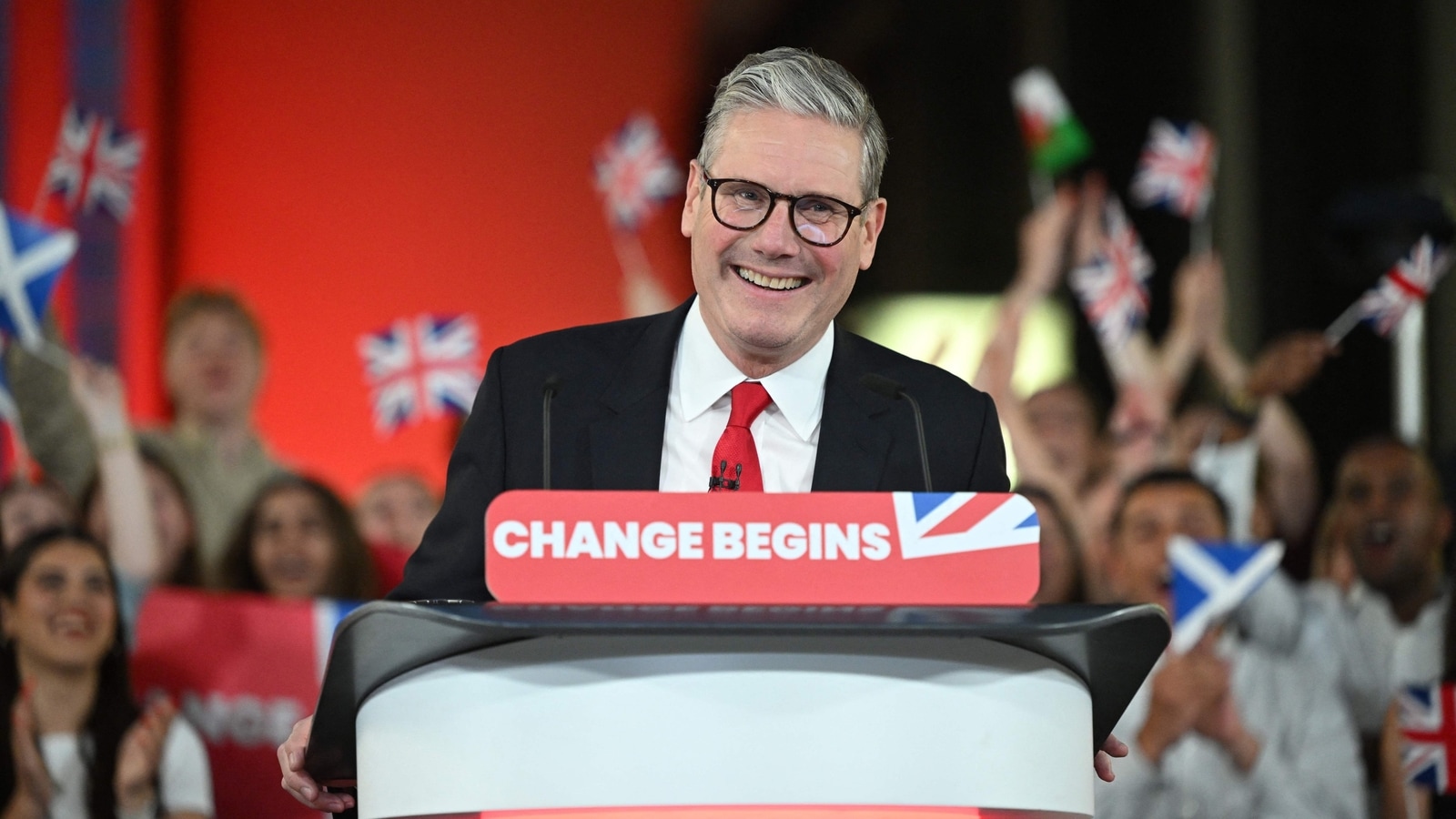Keir Starmer set to become new UK PM as Labour Party scores landslide win

Keir Starmer is all set to become the next Prime Minister of the United Kingdom following a historic victory by his centre-left Labour Party in the 2024 parliamentary election, ending 14 years of Conservative government.
Britain’s Labour Party leader Keir Starmer delivers a speech during a victory rally at the Tate Modern in London early on July 5, 2024. (AFP)
Labour Party secured over 400 seats out of 650, well beyond the 326-seat majority required to govern in the UK. Meanwhile, according to a report from The Guardian, the Conservatives struggled to secure even 120 seats.
At a celebratory rally in central London, Starmer, 61, declared, “change starts now,” and committed to a “decade of national renewal,” prioritising “country first, party second.” However, he cautioned that substantial change would require time. Labour’s triumph included gaining numerous seats from the Conservatives, including those held by nine Cabinet members and former Prime Minister Liz Truss.
According to his office, outgoing Prime Minister Rishi Sunak will deliver a statement in Downing Street around 0930 GMT before meeting with King Charles to formally step down following the Labour Party’s landslide election victory.
The statement mentioned that the newly elected Labour Prime Minister Keir Starmer will meet with Charles at Buckingham Palace before delivering a speech in Downing Street around 1120 GMT.
Leaders from Australia and New Zealand have congratulated Labour Party leader Keir Starmer on his electoral triumph.
When can Starmer take charge as UK PM?
The Labour Party’s victory in Britain’s general election marks the first change in government in 14 years. However, Labour leader Keir Starmer will not assume the role of prime minister until Friday’s scheduled ceremony, where King Charles III will formally invite him to establish a new government.
This moment underscores that, technically, the authority to govern in the United Kingdom still originates from royal prerogative, despite the transfer of real political power to elected Members of Parliament centuries ago.
What did Rishi Sunak say about the Conservatives’ loss?
British Prime Minister Rishi Sunak, acknowledging the defeat, described the outcome as a “sobering verdict” delivered by the British people, affirming that the Labour Party has won the election.
Sunak, who held onto his seat in North Yorkshire, told those gathered: “The Labour party has won this general election.”
“I take responsibility for the loss,” he said. “To the many good, hard-working Conservative candidates who lost tonight, despite their tireless efforts, their local records and delivery, and their dedication to their communities. I am sorry.”
He added that he had called Labour leader Keir Starmer to congratulate him on his victory. “Today, power will change hands in a peaceful and orderly manner, with goodwill on all sides. That is something that should give us all confidence in our country’s stability and future,” Sunak said.
Ex-UK PM Liz Truss loses to Labour
Liz Truss, who held the record for the shortest tenure as Britain’s Prime Minister, faced a setback as she lost her parliamentary seat in the UK general election.
Truss’s defeat underscored a broader trend: constituencies previously held by Conservative leaders since 2010 have shifted allegiance to either Labour or the Liberal Democrats, according to the Associated Press, reflecting a critical assessment of the Conservatives’ 14-year rule.
In a closely contested race, Truss lost her Norfolk South West constituency in eastern England to Labour by a margin of 630 votes.
How did other parties perform?
– Smaller parties, including the centrist Liberal Democrats and Nigel Farage’s Reform UK, garnered significant voter support. Reform UK secured four seats, including one for Farage in Clacton-on-Sea, after multiple unsuccessful attempts.
The Liberal Democrats achieved around 70 seats, slightly fewer than Reform UK, despite a slightly lower overall share of the vote. They benefitted from a more strategic distribution of their support under Britain’s first-past-the-post electoral system.
– The Green Party expanded its presence in Parliament, securing four seats compared to just one before the election, reflecting an increase in voter backing.
– The Scottish National Party faced substantial losses, holding most of Scotland’s 57 seats before the election but expected to retain only a few, primarily losing seats to Labour.
(With inputs from agencies)




